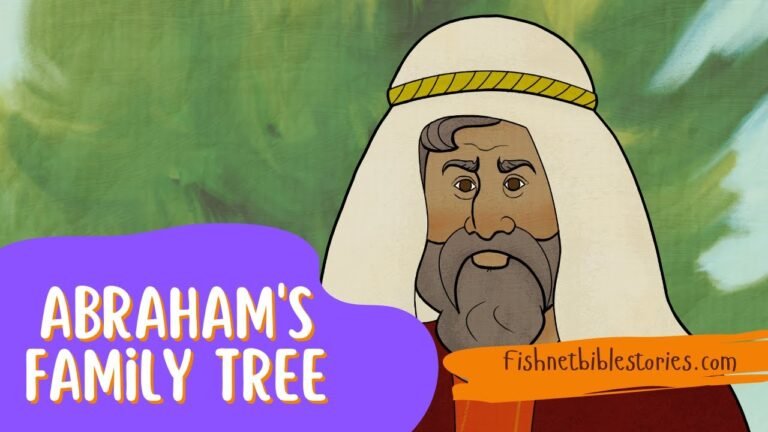The Legacy of Abraham’s Family
Abraham’s family has long been a focal point of historical and religious narratives, representing a diverse lineage that spans cultures and centuries. From the biblical patriarch revered in Judaism, Christianity, and Islam to the intricate tales of his descendants, the dynamics of Abraham’s family reveal profound insights into faith, tradition, and identity. This exploration delves into the significance of his familial ties, shedding light on how they have shaped spiritual and cultural landscapes around the world.
Who are the members of Abraham’s family in the Bible?
Abraham’s family in the Bible is foundational to both the Israelite and Arab peoples. He is revered as the patriarch of the Israelites through his miracle child, Isaac, whom he had with his wife Sarah in their later years. Additionally, he is recognized as the patriarch of the Arab nations through his firstborn son, Ishmael, whom he had with Hagar, Sarah’s Egyptian servant. This dual lineage highlights Abraham’s significant role in the shared heritage of these two great cultures.
What is the number of children Abraham had?
Abraham, a pivotal figure in biblical history, is often noted for his significant role as the father of many nations. He had a total of eight sons, each representing a different lineage. While his most well-known son is Isaac, born to his wife Sarah, he also had six sons with Keturah, his second wife. This diverse family tree highlights the complexity of Abraham’s legacy.
Among these sons, Isaac stands out as the child of promise, specifically chosen by God to fulfill the covenant established with Abraham. The distinction of Isaac as the only son of Abraham and Sarah emphasizes the divine plan that unfolded through their lineage. Thus, while Abraham’s descendants are numerous, it is Isaac who holds a unique place in the narrative of faith and fulfillment.
How many wives did Abraham have in total?
Abraham’s marital history is a topic of intriguing debate among scholars and theologians. According to one perspective, he had three wives: Sarah, Hagar, and Keturah. Sarah was his first wife, who bore him Isaac, while Hagar, Sarah’s maid, became the mother of Ishmael when Sarah was unable to conceive. After Sarah’s passing, Abraham is believed to have married Keturah, who gave birth to several children, further expanding his lineage.
Another interpretation suggests that Keturah may actually be identified with Hagar, implying that Abraham had only two wives. This view emphasizes the complexity of familial relationships in ancient texts, as well as the cultural dynamics at play. Both interpretations draw on Scripture for support, showcasing the multifaceted nature of Abraham’s story and the differing views within religious traditions.
Ultimately, the question of how many wives Abraham had reflects not only on his personal life but also on the broader themes of faith, legacy, and family in biblical narratives. Each perspective invites readers to explore the depth of Abraham’s character and the significant impact his relationships had on the unfolding of biblical history.
Unraveling Generations: The Impact of Abraham’s Lineage
The lineage of Abraham stands as a cornerstone in the narrative of faith, weaving together the destinies of diverse cultures and religions. His legacy, marked by profound promises and trials, has shaped the moral and ethical frameworks of millions. As the patriarch of Judaism, Christianity, and Islam, Abraham’s story transcends generations, illustrating themes of faith, obedience, and divine covenant that resonate across time and geography.
The impact of Abraham’s lineage can be observed in the rich tapestry of his descendants, each contributing to a legacy of resilience and perseverance. From Isaac to Jacob, and extending to the twelve tribes of Israel, these figures embody the struggles and triumphs of their faith journeys. Similarly, the lineage extends to the Islamic tradition with Ishmael, highlighting a shared heritage that emphasizes the importance of belief and submission to a higher purpose. This interconnectedness fosters a sense of unity among diverse communities, encouraging dialogue and understanding in an often-fractured world.
As we unravel the threads of Abraham’s lineage, we uncover the profound influence it has had on contemporary society. The moral lessons derived from his life continue to inspire individuals and leaders alike, urging them to embrace values of compassion, justice, and humility. In a time when divisions seem to deepen, the legacy of Abraham serves as a reminder of our common roots, inviting us to reflect on our shared humanity and the potential for harmony through mutual respect and understanding.
Faith, Promise, and Heritage: Exploring a Lasting Legacy
In a world constantly in flux, the threads of faith, promise, and heritage weave a rich tapestry that connects past generations to the present and future. These enduring elements shape our identities and values, instilling a sense of purpose and belonging. By honoring the traditions and commitments handed down through our lineage, we not only preserve the wisdom of our ancestors but also empower ourselves to forge new paths. As we explore the legacy of our shared beliefs, we find inspiration in the stories that define us, reminding us that the promises we make today lay the foundation for a brighter tomorrow.
From Abraham to Today: A Journey Through Time and Influence
The journey from Abraham to the present day is a rich tapestry woven with the threads of faith, culture, and influence that have shaped civilizations. Starting with the patriarch’s covenant, a legacy of monotheism took root, inspiring countless generations and giving rise to three major religions: Judaism, Christianity, and Islam. Each faith, while distinct, shares a common heritage that has fostered moral values, community bonds, and a quest for understanding the divine. As this historical narrative unfolds, it reveals how the teachings of Abraham have transcended time and geography, impacting social structures, art, and philosophy. Today, in an increasingly interconnected world, the enduring relevance of these beliefs continues to provoke dialogue, inspire change, and promote a deeper appreciation for our shared humanity.
Abraham’s family stands as a testament to the enduring power of faith, resilience, and unity. Their journey, marked by trials and triumphs, serves as an inspiring narrative that transcends generations. By examining the dynamics and lessons within Abraham’s lineage, we uncover not only the roots of a rich heritage but also the timeless values that continue to resonate in our lives today.







